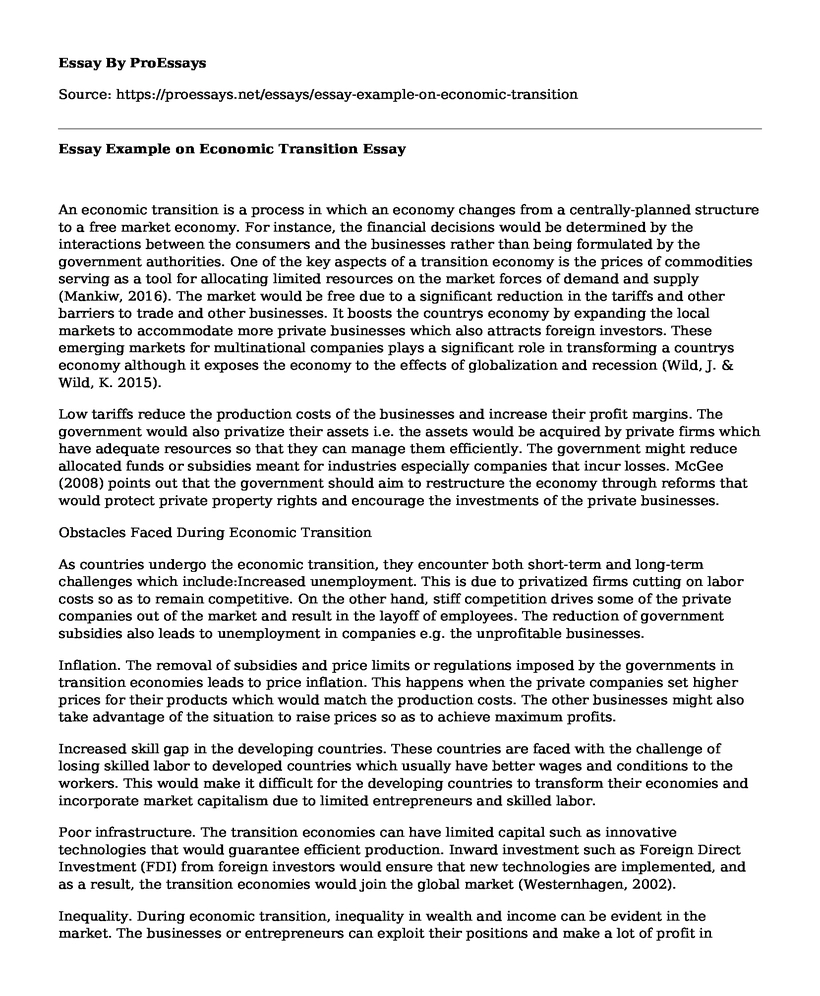An economic transition is a process in which an economy changes from a centrally-planned structure to a free market economy. For instance, the financial decisions would be determined by the interactions between the consumers and the businesses rather than being formulated by the government authorities. One of the key aspects of a transition economy is the prices of commodities serving as a tool for allocating limited resources on the market forces of demand and supply (Mankiw, 2016). The market would be free due to a significant reduction in the tariffs and other barriers to trade and other businesses. It boosts the countrys economy by expanding the local markets to accommodate more private businesses which also attracts foreign investors. These emerging markets for multinational companies plays a significant role in transforming a countrys economy although it exposes the economy to the effects of globalization and recession (Wild, J. & Wild, K. 2015).
Low tariffs reduce the production costs of the businesses and increase their profit margins. The government would also privatize their assets i.e. the assets would be acquired by private firms which have adequate resources so that they can manage them efficiently. The government might reduce allocated funds or subsidies meant for industries especially companies that incur losses. McGee (2008) points out that the government should aim to restructure the economy through reforms that would protect private property rights and encourage the investments of the private businesses.
Obstacles Faced During Economic Transition
As countries undergo the economic transition, they encounter both short-term and long-term challenges which include:Increased unemployment. This is due to privatized firms cutting on labor costs so as to remain competitive. On the other hand, stiff competition drives some of the private companies out of the market and result in the layoff of employees. The reduction of government subsidies also leads to unemployment in companies e.g. the unprofitable businesses.
Inflation. The removal of subsidies and price limits or regulations imposed by the governments in transition economies leads to price inflation. This happens when the private companies set higher prices for their products which would match the production costs. The other businesses might also take advantage of the situation to raise prices so as to achieve maximum profits.
Increased skill gap in the developing countries. These countries are faced with the challenge of losing skilled labor to developed countries which usually have better wages and conditions to the workers. This would make it difficult for the developing countries to transform their economies and incorporate market capitalism due to limited entrepreneurs and skilled labor.
Poor infrastructure. The transition economies can have limited capital such as innovative technologies that would guarantee efficient production. Inward investment such as Foreign Direct Investment (FDI) from foreign investors would ensure that new technologies are implemented, and as a result, the transition economies would join the global market (Westernhagen, 2002).
Inequality. During economic transition, inequality in wealth and income can be evident in the market. The businesses or entrepreneurs can exploit their positions and make a lot of profit in returns towards their investments. The consumers would be faced with increased inflation while workers lose their jobs in the privatized companies.
Corruption. The presence of corruption in the transition economies undermines the effective implementation of market reforms. Inferior products are introduced and sold in illegal markets where there are limited regulations. According to World Bank, William Davidson Institute & Handelshogskolani Stockholm, (2000), the privatized firms might have non-transparent involvement with the government institutions to change the implementation of regulations on the companies business operations.
References
Mankiw, N. G. (2016). Business Economics. Cengage Learning.
McGee, R. W. (2008). Corporate governance in transition economies. (Corporate Governance in Transition Economies.) New York, NY: Springer.
Westernhagen, N. (2002). Systemic transformation, trade and economic growth: Developments, theoretical analysis and empirical results. Berlin: Springer-Verlag.
Wild, J. J., & Wild, K.L. (2015). International business: The challenges of globalization (8th ed.). Don Mills, Ontario: Pearson Education.
World Bank, William Davidson Institute, & Handelshogskolani Stockholm. (2000). Transition newsletter: The newsletter about reforming economies. Washington, D.C: World Bank.
Cite this page
Essay Example on Economic Transition. (2021, Jun 15). Retrieved from https://proessays.net/essays/essay-example-on-economic-transition
If you are the original author of this essay and no longer wish to have it published on the ProEssays website, please click below to request its removal:
- Paper Example on Analysis of the Impact of International Trade on the Economic Growth
- Movement in the Exchange Rate Between the Chinese Yuan and the US Dollar
- Legal Protection for the Individual Employee Paper Example
- Operation in the Global Market Essay
- Essay on AACN Research Results: Diabetes and Cancer Rate Increase With Globalization
- Essay Example on Globalization Brings Cumulative Crisis in African Nations: A Study
- The Short-Run and Long-Run Relationship Between Unemployment and Inflation - Essay Example







